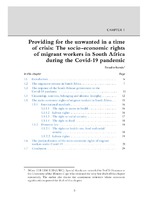| dc.description.abstract | Migrants are amongst the most vulnerable groups in South Africa. They are often
subjected to harsh forms of discrimination and excluded from government policy
considerations. They have not fared differently under the Covid-19 responses by the
government. This is because, while South Africa is a middle-income country, at least
half its households struggle to meet their needs, particularly when there are market
disruptions. Accordingly, a widely held view is that already sparse government resources
cannot be spent on ‘foreigners’ who ‘voluntarily migrated’ to South Africa and ‘take
up jobs meant for locals’. Assistance to unemployed migrants is viewed as insensitive to
the plight of unemployed citizens who have no access social protection or jobs. Against
this backdrop, this chapter assesses the response of the South African government to the
socio-economic rights (SERs) of the migrant population. It further interrogates whether
the South African government has used best practice labour and humanitarian standards
to protect SERs of migrants during the Covid-19 pandemic. | en_US |

